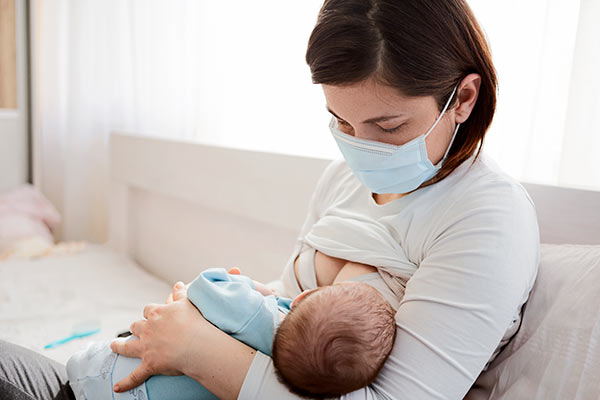A new study led by researchers from UCLA has found that infants born to mothers who were infected with COVID-19 during pregnancy have three times the risk of developing respiratory distress compared to unexposed infants, even if they themselves were not infected with the virus. However, the risk was significantly lower for infants whose mothers were vaccinated prior to infection.
The study, published in the journal Nature Communications, revealed that in-utero exposure to the SARS-CoV-2 virus triggered an inflammatory reaction in the infants, increasing their susceptibility to a respiratory disorder that is typically found in premature babies.
Dr. Karin Nielsen, professor of pediatrics at the David Geffen School of Medicine at UCLA and senior author of the study, noted that there were notably high rates of respiratory distress shortly after birth in full-term babies born to mothers who had contracted COVID-19 during pregnancy. She highlighted that the mothers had not been vaccinated prior to contracting the virus, leading to the conclusion that vaccination protects against this particular complication.
To better understand how respiratory distress develops following exposure to the SARS-CoV-2 virus in the womb, the researchers conducted a proteomics study to examine the structure and functions of proteins and their impact on cells. They discovered that motile cilia, whip-like structures that aid in clearing mucus from the respiratory tract, did not function properly in the infants with respiratory distress. Additionally, these infants exhibited higher production of antibodies known as immunoglobulin E (IgE).
Of the 221 mothers who participated in the study, 151 (68%) were unvaccinated prior to infection. Severe or critical COVID-19 symptoms were observed in 23 of these women (16%), compared to only three (4%) among the vaccinated mothers. The researchers found that 34 (17%) of the 199 exposed infants in the study developed respiratory distress, a significantly higher rate compared to the general population where the condition occurs in only 5% to 6% of babies. Notably, 21% of infants with respiratory distress were born to mothers with severe or critical COVID-19, whereas only 6% of infants without respiratory distress were born to mothers with severe disease, a statistically significant finding.
Furthermore, out of the 34 infants with respiratory distress, only five (16%) were born to mothers who had been vaccinated before infection, while 63 (41%) of infants without the breathing disorder had vaccinated mothers. This indicates that vaccination provides a protective effect. The researchers also noted that even a single dose of an mRNA vaccine prior to infection significantly reduced the likelihood of full-term infants developing respiratory distress.
The study, however, does have some limitations. Most of the participants were enrolled from a large medical center that primarily deals with severe cases, potentially skewing the findings towards more severe COVID-19 illness. In addition, the researchers did not have data on the effects of COVID-19 infection before vaccination or on vaccination after infection, which could impact maternal disease severity and its effects on fetal development. The small sample size also warrants caution in interpreting the results.
In conclusion, the study highlights the elevated risk of respiratory distress in infants born to mothers infected with COVID-19 during pregnancy. It underscores the importance of maternal vaccination in protecting both the mother and the unborn child from the potential complications associated with the virus. Further research is needed to better understand the long-term effects and potential interventions for infants at risk of respiratory distress due to in-utero exposure to SARS-CoV-2.
*Note:
1. Source: Coherent Market Insights, Public sources, Desk research
2. We have leveraged AI tools to mine information and compile it

